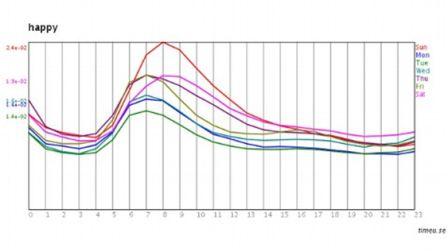Two Cornell University researchers, graduate student Scott Golder and sociology professor Michael Macy, as a result of their analysis of Twitter (News - Alert) traffic — which they believe is an interesting barometer of what people are doing and how they feel about that and other things during the day — have the Internet literally all atwitter.
They believe the popular social media service has reached a critical mass in terms of number of users and number of daily tweets. This is a large enough sampling to provide a unique laboratory for understanding individual and mass social behavior. They analyzed the tweets of 2.4 million people in 84 countries and, with some caveats on the utility of the results, they uncovered interesting data from running 509 million tweets from 2010 through a computer program they developed to discern people’s moods based on the appearance of certain key words in the messages.
The research results were published in the current edition of the journal Science. As an article on the project on the ABC News site described it, what they have created is, in essence, a first generation equivalent of a “global mood ring.”
So how and what are we doing, according to Golder and Macy? At a high level, they found that patterns reflecting moods and activities were relatively consistent around the world despite geographic, cultural and religious diversity. For instance, tweets of the word “happy” universally are heaviest in the morning, tail off during the day, and get rejuvenated at night.
While this makes sense intuitively, seeing it reflected in numbers, as in the example below, is intriguing.

Tweets of the word "happy" during the day, according to Timeu.se. Courtesy Scott Golder, Cornell University
The best part of what the two researchers did may be allowing all of us to have fun creating our own data maps based on a selection of key words we are interested in. The proof is in the trying. Golder, as referenced above, has created a web site where you can play for hours. I will not spoil the fun by giving away the words I tested except to say this is almost as addictive and Angry Birds, and try all four views of the output.
On the site, Golder briefly goes over a principal attraction of the approach taken.
Some people say that Twitter conversations are "pointless" or "babble" or that people tweet about "what they had for breakfast." But if you think about it, most casual conversations are just as inconsequential — we just don't record them forever on the web!
I think it's great that people tweet what they had for breakfast, or that they're stuck in traffic or are mowing the lawn. Because what sociologists have always wanted to be able to do is get very detailed measures of how people spend their time without bothering them too much by asking them. Now, by simply examining the conversations that they're having in public, we can do it without bothering them at all!
In various interviews and postings on the sudden popularity of the tool, Golder has been careful to point out that the tool has its limitations. He admitted to ABC that: “We’re measuring the expression of something, not the action itself.” Caution also needs to be taken since Twitter users tend to be younger, better educated and popular cultured focused. All of this means that everyone needs to be careful before taking the results as gospel.
As a window on the world, this is fascinating on its own. As a portent of scientists being able to use social media to get more granular input into human behavior, such analytics clearly demonstrate the immense opportunities that lay ahead to use such information to enable people and company to better manage such critical things as work/life balancing challenges. This is an unobtrusive, and at least for the moment, totally anonymous way to find out what we do and how we feel about it as we do it.
Is Twitter us? Not necessarily, but it is has grown up enough to the point where it is becoming a useful and relatively reasonable facsimile. Given all of the changes and challenges going on with Facebook (News - Alert) and Google+, especially in regard to personal privacy concerns from things like picture tagging and automatic sharing, we certainly have entered a truly brave new world on a variety of fronts. However, knowledge is power, and such tools can be immensely valuable when in the right hands and used for the best purposes.
Please feel free in the comments to this article to share any insights you may gain from using the tool. That of course may be a function of the mood you are in. I look forward to it.
Peter Bernstein is a technology industry veteran, having worked in multiple capacities with several of the industry's biggest brands, including Avaya, Alcatel-Lucent, Telcordia, HP, Siemens (News  - Alert), Nortel, France Telecom, and others, and having served on the Advisory Boards of 15 technology startups. To read more of Peter's work, please visit his columnist page.
- Alert), Nortel, France Telecom, and others, and having served on the Advisory Boards of 15 technology startups. To read more of Peter's work, please visit his columnist page.
Edited by Rich Steeves
